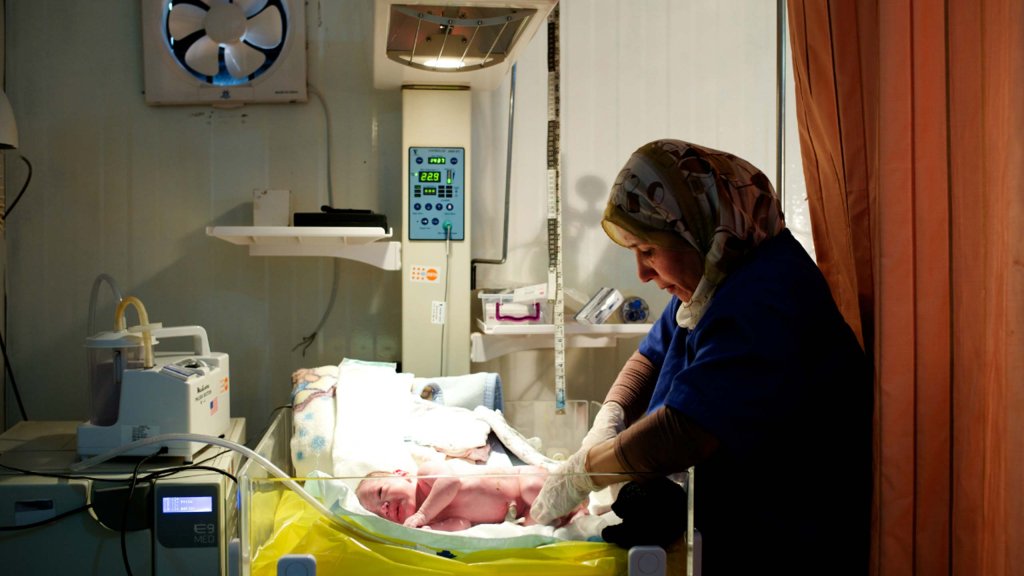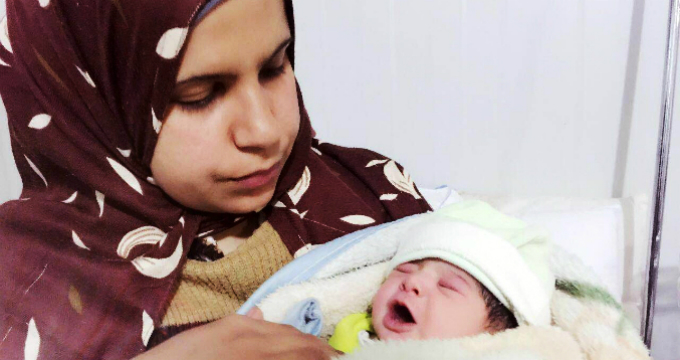Safe and Sound in Zaatari Camp for Syrian Refugees

Muhammad’s mother had given birth to five babies in rapid succession, which complicated Muhammad’s delivery. But all went smoothly, and mother and baby are happy and healthy. © Alixandra Fazzina/NOOR/Picture This Productions
Every soon-to-be mom wants her birth to be smooth and for her and the baby to be healthy. But for women whose lives have been thrown into disarray by a refugee crisis, the questions become more fundamental. Where will I be when I go into labor? How long can I stay there? Will I have access to health care? How will I be able to communicate with my nurses and doctors? Will my family be with me? Will they even be in the same country? Will they be alive?
We try to alleviate some of this stress by providing women and girls with lifesaving sexual and reproductive health care, like prenatal care and safe delivery care, no matter their circumstances. The world’s largest refugee and displacement crisis is in Syria and the surrounding countries of Turkey, Iraq, Lebanon, Egypt, and Jordan. More than 13 million Syrians have fled their homes for safety.
Almost 80,000 of these refugees are living in Jordan’s Zaatari Camp. For over a decade, UNFPA has supported a maternal and newborn health clinic in the camp. Miraculously, over 14,000 babies have been in Zaatari without a single maternal death. Hear from just some of the many women, health care providers, and advocates who have made this possible:
Reem

“It started as a joke as we watched the camps in Jordan on television. Then, it turned into our reality,” Reem remembers from her caravan in Zaatari. “They said it was going to be difficult to carry all our things to the border so I only took a change of clothing. I had a photo album; it was my childhood. I regret leaving it behind.”
Family photos weren’t the only thing Reem had to leave behind in Syria. She also lost her dream of pursuing higher education. “My whole life changed. My aspirations were much bigger than this. I had hoped to finish my education… I didn’t think of marriage before.”
But after arriving in Zaatari, Reem got married. She and her husband now have two children–just some of the many children who were born safely in the camp. Reem is using family planning, but she would eventually like to have another child. However, she is worried about having to pick up and move back to Syria while pregnant. Reem explains, “In Syria, there won’t be a place for me to deliver my baby safely. I won’t have an income to support my children.”
In Zaatari, Reem knows that she can rely on UNFPA for family planning services now and safe motherhood care in the future.
Ammoun

But these deliveries have not been without their challenges. Cold weather in the winter, movement restrictions and health risks from COVID-19, and staffing shortages have forced Ammoun to work twice as hard to meet the needs of her patients. But for Ammoun, the health and safety of her “daughters,” as she calls her patients, is worth it.
Ammoun explains, “Maybe God did not intend for me to have children of my own… However, I consider all the children as my own, because I was there for them when their eyes saw light for the first time.”
Saba

“A girl I know from school here in the camp got married last year when she was 15. Three months ago, she was pregnant with twins but had a miscarriage. I told her she should stop because her body isn’t ready yet, but she and her husband are adamant about having a child,” said Saba, 16, who advocates to end child marriage in Zaatari.
Saba’s efforts are a key part of preventing maternal death in Zaatari. Sadly, rates of this harmful practice have skyrocketed among refugee populations, threatening girls’ health and safety.
Child Marriage on the Rise
In 2012, before the war, about 18 percent of marriages involved a child, but in 2015, this number had jumped to 35 percent. Many marriages in the camp are informal, so the real number of child brides could be higher still. Child marriage is a response to uncertainty, economic hardship, and violence, and often, girls have little say in the matter. Parents may feel that by marrying off a daughter, they are able to ensure she has a place to live, food to eat, and is free from violence. However, parents often overlook the many dangers of child marriage, including that husbands can be a source of violence.
But Saba has a solution. “The girls that are in schools are the ones most likely not to get married. When a girl gets an education and a diploma, she has a chance to get a good job instead of a husband who controls her,” she explained. We work with advocates like Saba to raise awareness of the harms of child marriage. And, for girls who do become pregnant in Zaatari, we provide the care they need to be safe as they enter motherhood.
Kholoud

“It was easier this time than the first,” said 21-year-old Kholoud Suliman, after giving birth to her second daughter, Rima, in 2016. Rima was the 5,000th baby to be born in Zaatari with support from UNFPA’s safe motherhood efforts. In honor of the occasion, Kholoud and her husband Mohammad decided to name their daughter after the doctor who delivered her, Dr. Rita Diab. Kholoud’s first daughter, Alaa, was also born in Zaatari.
Today, there are over 670,000 Syrian refugees in Jordan and an estimated 15,000 of them are pregnant at any time. Thanks to your support, we have been able to provide access to quality sexual and reproductive health care to Syrian refugees from the beginning of the war in 2013, to Rima’s birth in 2016, to today. But, 11 years into the war, Syrian refugees still need your help. A generous contribution can provide Syrian refugees with continuous access to lifesaving sexual and reproductive health care, including prenatal and safe delivery care. Every pregnant woman and new mom deserves to be safe and healthy, no matter what.